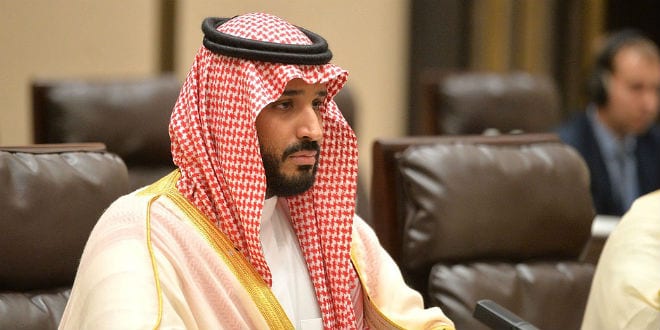Last week, the reigning Saudi monarch replaced one crown prince with another, dividing the fragmented world of Islam even further, increasing the tensions between Sunni Islam and Shiites. The shifting reality in the Middle East has political analysts in a quandary, but this very development was predicted explicitly in an ancient Jewish source, and one rabbi, an expert in end-of-days prophecy, explained that this global shift in politics is returning the world to a more Biblical framework.

A drama unfolded in Saudi Arabia last Wednesday as Saudi King Salman bin Abdulaziz Al Saud named his son, Mohammed bin Salman, 31, to be his successor to the throne. The move is contentious, creating conflict in the upper echelons of Saudi royalty. In order to make the appointment, King Salman had to remove the current crown prince, Mohammed Ben Naif, from the position. Ben Naif, the king’s cousin,was barred from leaving the kingdom and confined to his palace in the coastal city of Jidda in order to prevent any conspiring or infighting.
Prince Mohammed is currently the kingdom’s Defense Minister and is a regional leader in the Sunni opposition to Iran. Prince Mohammed has united most of the Sunni countries in an alliance to oppose the burgeoning strength of the Shiite nations – led by Iran. The two groups, Sunni and Shiite, are fighting via proxy forces in a number of Arab countries, including Syria and Yemen.
In his role as Defense Minister, Mohammed bin Salman classified the Shiite Hezbollah group as a terror organization, led the move to isolate Qatar for its increasing cooperation with Iran, and signed a massive arms deal with the US for $100 million in new military hardware. Mohammed bin Salman is also reported to enjoy close ties with Israeli defense officials.
This royal reshuffling has political pundits scratching their heads, though the implications are dire. American President Donald Trump is currently building a coalition to oppose Iran, and Saudi Arabia is expected to fulfill a leading role in it, though now, it is unclear how the new Saudi king fits in, or how the other Muslim nations, friend and foe, will react.
The surprising appointment of Mohammed as the successor to the throne conforms to the sequence of events predicted in the Yalkut Shimoni, a compilation of rabbinic commentary on the Bible, is believed to have been composed in the 13th century. In the section dealing with the Book of Isaiah, the following passage appears:
“Rabbi Yitzchak said: ‘In the year in which the Messiah-King appears, all the nations of the world are provoking each other. The King of Persia (Iran) provokes an Arab king and the Arab king turns to Aram for advice. And the King of Persia (Iran) goes back and destroys the entire world. And all the nations of the world are in panic and distress and they fall upon their faces and are seized with pains like those of a woman giving birth, and Israel are in panic and distress and asking ‘where shall we go? Where shall we go?,’ and He says to them ‘my sons, do not fear; all that I have done, I have done only for you. Why are you afraid? Do not fear, your time of redemption has come, and the final redemption is not like the first redemption, because the first redemption was followed by sorrow and servitude under other kingdoms, but the final redemption is not followed by sorrow and servitude under other kingdoms.”
Rabbi Pinchas Winston, prolific author and End-of-Days scholar, explained that in the context of this prophecy, Iran could indeed be identified as its previous incarnation: the nation of Persia. The Arab king referred to in the text could be the king of Saudi Arabia, present or future. But the identity of Aram is much more problematic.
“Geographically, Aram was Babylonia, known today as Iraq,” Rabbi Winston told Breaking Israel News. “But it doesn’t necessarily come down to that. When the Bible uses these national names, it is identifying them also by their characteristics, their soul-natures.”
Rabbi Winston said that it is important to step back and see the prophecy in context of the larger picture.

“What the prophecy is telling us on a basic level is that when these specific things happen, it means that things are moving,” the rabbi said. “You should be looking for something significant, something stunning and earthshaking,that will happen in ways that don’t make sense unless you see it in a divine light.”
Rabbi Winston stated unequivocally that current events lead to one conclusion: the world has reverted to a Biblical reality in which prophecy is more relevant than ever before.
“In the times of the Bible, even the evil people believed in God, but then the world entered a period of hester panim (the hiding of God’s face),” the rabbi explained. “It became possible to not believe in God. We are returning to the Biblical framework, when current events become similar to events in the Bible, because God is again revealing himself.”
Unlike political analysts who are unsure where current events are leading, the rabbi seemed clear.
“When you can start reading history and current events back into the Bible, that is in itself a sign that we are in the times of the Moshiach (Messiah),” he said. “ At this point, it looks like this has nothing to do with Israel, but as we know, in the end-of days it all comes down to Israel.”




